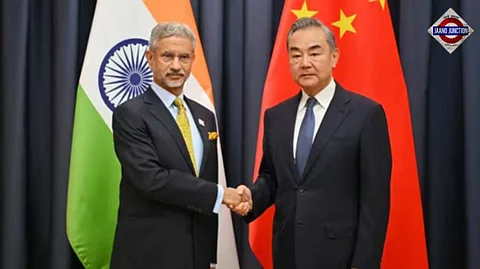

External Affairs Minister S Jaishankar met with Chinese Foreign Minister Wang Yi on Tuesday on the sidelines of the G20 Summit in Rio de Janeiro. It marked their first meeting since India and China signed the border disengagement deal in October.
The two leaders discussed disengagement along the India-China border, among other global issues. Commenting on the meeting, Jaishankar stated that the on-ground implementation of the border agreement has progressed as planned along the Line of Actual Control (LAC).
During the BRICS Summit in Kazan in October, Prime Minister Narendra Modi and Chinese President Xi Jinping, after their meeting, emphasised that a foreign minister-level meeting would take place at the earliest.
"In Kazan, our leaders reached a consensus in taking the next steps in our relations, bearing in mind the (border) understanding of 21st October. I am glad to note that on-ground implementation of that understanding has proceeded as planned," Jaishankar said.
"We noted the progress in the recent disengagement in the India-China border areas. And exchanged views on the next steps in our bilateral ties. We also discussed the global situation," the minister added.
He noted that both the nations' contribution to the G20 and Brics platforms highlighted the significance of the countries in international politics and underscored the importance of bilateral relations.
Ahead of the Jaishankar-Wang Yi meeting, a Chinese Foreign Ministry spokesman said that the country stands ready to deliver on important common understandings reached between PM Modi and Chinese President Xi.
“China stands ready to work with India to deliver on the important common understandings between the leaders of the two countries, step up communication and cooperation and enhance strategic mutual trust,” the spokesman said, responding to a question on the likelihood of a meeting between PM Modi and Xi on the sidelines of the G20 summit.
On October 21, India announced a major breakthrough in reaching a border agreement with China to end the longstanding standoff, during which both armies had amassed troops, military infrastructure, and temporary posts on each side.
Beijing, which confirmed the agreement the following day, stated that a resolution had been reached on "relevant matters" and that it would work alongside New Delhi to implement the terms of the agreement.
Following this, both armies began disengagement, dismantling the structures they had set up, starting with the friction points in Depsang and Demchok, and pulling back personnel to the positions held prior to the confrontation. The process continues in the Ladakh region.
